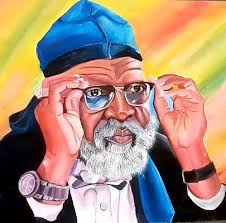By Eric Wamanji
“Think Different.” That’s how Apple Computers challenged the world in1997 with its advertising slogan. What followed was a revolution in computer uptake. That’s what the Roots Party Presidential Candidate Prof George Wajackoyah seem to do. And he has electrified our imaginations, rubbished humdrum norms, hypnotized the youth, and riled “moralists”.
“hero’s journey”
Thus, Wajackoyah is gradually etching into our psyche- becoming a myth, a legend. But why? His is unscripted, eccentric, and unpretentious. That he rises outside the usual pedigree political milieu, with an intriguing life story of twists and turns, captivates. In fact, he’s almost fitting the classic Joseph Campbell’s “hero’s journey” used in narratives.
Ironically, if there is a group boosting Wajackoya’hs profile, it’s the cleric. On ganja, while the state is bemused, the church is livid. A section of the clergy has come out guns blazing to condemn the “evil mindset”. It has also urged followers not to vote for people who promote drug use. Though the same church is mute when corruption is directly chewing Kenyans for lunch. But that story of hypocrisy is for another day. Wajackoyah has clarified his bang plank is commercial -for medicinal purposes.
Forbidden Fruit Effect
Still, the more the clergy chastise the professor, the popular he becomes. It’s what psychologists call the Forbidden Fruit Effect- the more you forbid something, the more desirable it becomes for the illicit elicit thrill. Indeed, Mark Twain was spot on when he mused that “there is a charm about the forbidden that makes it unspeakably desirable.”
Interestingly, the good professor is fashioning himself as being of the divinity. His 10-point manifesto imagines the 10 Commandments. He associates with the Lion of Judah. Indeed, what else constructs a myth than a claim to the divine? See, in Kisumu, Wajackoyah pulled a wacky one. He lay prostrate atop his campaign vehicle. He claimed to have been in conversation with Mr Raila Odinga, the Azimio la Umoja Presidential Candidate, through a dream. You need supernatural powers for that. And Wajackoyah basically wanted us to believe he possessed those powers. He fashions himself as belonging to the spirits- a paranormal being. Ideally, such characters do not fit the usual anthropological binaries. The sacred are to be feared, revered even worshiped.
Taboo
And the fact that he can confront the taboo- legalizing bhang, hanging the corrupt, raring snakes etc- endears himself to the adventurous youth bored by empty rhetoric. This radical posture, intrigues, and packages the man as courageous. Human beings, innately, love courage. It’s not for nothing that it is one of the four Platonic virtues.
Wajackoyah’s choice of garb captivates too. While other presidential candidates scrambled for image experts, perfectly fitting suits, matching ties, or African print, to Wajackoyah that’s too pretentious, predictable, conformist even. He loves khaki (rolled up sleeves) and a turban. The youth, who generally distaste conventions, easily identify with this rebellious streak as authentic.
Then at the heart of this myth-making are narratives. Narratives have power they construct myth. The bizarre the story, the potent the myth. Now, what appears odd also fits the mass media’s frame of news values. Wajackoyah’s prescriptions are novel. He makes news and banter for social places.
That’s not all. His looks. With a near-Gandalfian beards and a headband, he cuts the image of a rebel, revolutionist, a Marxist maybe. Beards have power. They manifest fierceness, masculinity, intellect, and dependability. And oh yes, studies too show, women are attracted to bearded men. His portrait thus is stuff for popular art on T-shirts and matatus – just like Che Guevara. A fabled man indeed.
Gimme a joint!

